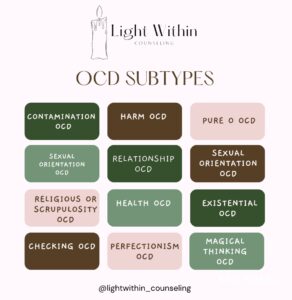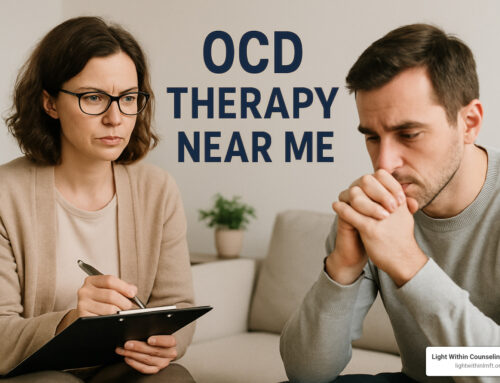Subtypes of OCD

So what is OCD? Obsessive-Compulsive Disorder (OCD) is a mental health condition characterized by intrusive thoughts (obsessions) and repetitive behaviors or mental acts (compulsions) aimed at reducing distress. While many people think of OCD in terms of visible behaviors like excessive handwashing or checking, it actually manifests in various subtypes that can significantly impact daily life. Understanding these subtypes is key to finding effective treatment and support. Many people feel really uncomfortable talking about some of the OCD subtypes (also know as OCD themes) they have, such as harm OCD or pedophilia OCD (POCD), but our therapists at Light Within Counseling in Roseville are trained to help you work through your obsessions and compulsions so you are no longer held back from OCD or have to feel alone in the shame. These are normal things many people deal with when they have OCD.
Remember, your OCD subtype doesn’t define who you are—it’s simply a reflection of what you deeply care about. The intrusive thoughts target what matters most to you, twisting it into fear or doubt. But that fear is not the truth; it’s your mind trying to protect what you value. Whether it’s your health, relationships, morality, or safety, your theme speaks to your strongest values, not your identity. You are so much more than your OCD—your worth isn’t tied to the fear. It’s rooted in your resilience, your capacity for growth, and the light within you. Our therapists at Light Within Counseling in Roseville can help you overcome your OCD.
Common OCD Subtypes and How They Manifest
Obsessive-Compulsive Disorder (OCD) can show up in a variety of ways, often revolving around specific themes or concerns. These themes drive the intrusive thoughts (obsessions) and repetitive behaviors (compulsions) that characterize OCD. While everyone’s experience is unique, here are some of the most common ways OCD manifests:
1. Contamination OCD
-
Fear of germs, illness, or environmental contaminants.
-
Compulsions include excessive cleaning, handwashing, or avoiding “dirty” places or objects.
2. Harm OCD
-
Intrusive fears of causing harm to oneself or others, either intentionally or accidentally.
-
May lead to avoidance of certain activities, people, or objects to prevent harm.
3. Relationship OCD (ROCD)
-
Doubts about the quality or “rightness” of a relationship.
-
Compulsions include reassurance-seeking, overanalyzing feelings, or repeatedly questioning compatibility.
4. Perfectionism OCD
-
Fear of making mistakes or not meeting high standards.
-
Compulsions often involve repetitive checking, redoing tasks, or obsessively planning.
5. Health Anxiety OCD
-
Obsessions about physical health or bodily sensations, fearing serious illness.
-
Compulsions may include excessive research, self-examinations, or frequent visits to medical professionals.
6. Symmetry and Order OCD
-
A need for things to feel “just right” or balanced.
-
Compulsions often involve arranging or aligning items until they feel perfect.
7. Magical Thinking OCD
-
Belief that certain thoughts or actions can prevent unrelated negative events.
-
Often involves rituals or superstitions, like repeating phrases or avoiding specific numbers.
8. Intrusive Thoughts OCD
-
Unwanted, distressing thoughts about taboo topics (e.g., violence, sexuality, or morality).
-
These thoughts are ego-dystonic, meaning they conflict with the person’s values.
9. Postpartum OCD
-
Intrusive fears of harming one’s baby or being an inadequate parent.
-
May lead to excessive monitoring, avoidance of caregiving, or seeking reassurance.
10. Existential or Philosophical OCD
-
Obsessions about the meaning of life, reality, or time.
-
Compulsions include excessive mental analysis or seeking answers to unanswerable questions.
11. Checking OCD
-
Repeated checking of locks, appliances, or other items to ensure safety.
-
Can consume significant time and create anxiety about leaving home.
12. Hoarding-Related OCD
-
Fear of discarding items that might be needed in the future.
-
Compulsions involve saving or collecting items, often leading to clutter.
13. Pure Obsessional OCD (Pure O)
-
Intrusive thoughts without obvious physical compulsions.
-
Mental rituals like reassurance-seeking or neutralizing thoughts are common.
Note: OCD themes can overlap, evolve, or change over time. Every individual’s experience with OCD is unique, even if the themes are similar.
Understanding OCD
OCD themes and behaviors often overlap or evolve, making each person’s experience unique. For instance, someone may start with fears about contamination and later struggle with intrusive thoughts about harm. Recognizing these patterns is key to understanding how OCD impacts daily life and relationships.
If you or a loved one is experiencing OCD, evidence-based treatments like Exposure and Response Prevention (ERP) can help. With the right support, relief and recovery are possible.
How OCD Impacts Daily Life
Living with OCD can feel overwhelming, as the condition often consumes significant time, energy, and mental space. The persistent cycle of obsessions and compulsions can interfere with nearly every aspect of life, creating challenges that go beyond the intrusive thoughts themselves.
-
Relationships:
-
OCD can strain relationships with loved ones, as compulsions and avoidance behaviors may be misunderstood or create tension.
-
For example, someone with Relationship OCD (ROCD) may excessively seek reassurance or question the validity of their partnership, which can erode trust and intimacy over time.
-
Friends and family may also feel helpless or frustrated when trying to provide support, which can lead to isolation.
-
-
Career and Academic Success:
-
OCD can make it difficult to focus on tasks, meet deadlines, or engage in collaborative work.
-
Compulsions like repetitive checking or redoing assignments can consume hours, leaving less time for productivity.
-
The fear of making mistakes or not meeting perceived high standards may cause individuals to procrastinate, avoid tasks, or become overly perfectionistic, further hindering success.
-
-
Mental “Space” and Cognitive Load:
-
The constant presence of intrusive thoughts and the need to perform rituals leave little room for creativity, problem-solving, or relaxation.
-
This mental clutter can make everyday decisions feel exhausting and leave individuals in a near-constant state of mental fatigue.
-
-
Emotional Well-being:
-
OCD often leads to feelings of shame, frustration, and hopelessness. People with OCD may feel embarrassed by their thoughts or behaviors, even though they recognize that these are irrational or excessive.
-
Anxiety, depression, and low self-esteem frequently accompany OCD, compounding the emotional toll.
-
-
Hobbies and Leisure:
-
Activities that once brought joy may become sources of stress if OCD interferes. For instance, someone with contamination fears might avoid traveling, dining out, or engaging in social gatherings.
-
The fear of encountering triggers can lead to avoidance of enjoyable experiences, further reducing quality of life.
-
-
Physical Health:
-
Compulsions such as excessive cleaning or washing can lead to physical harm, such as skin damage or exhaustion.
-
Sleep may be disrupted by obsessions or late-night rituals, impacting overall health and energy levels.
-
-
Family Dynamics:
-
In families, OCD can dominate household routines, as loved ones may feel pressured to accommodate compulsions or avoid triggers.
-
This can lead to frustration, resentment, or enabling behaviors that unintentionally reinforce the OCD cycle.
-
Breaking the Cycle
The effects of OCD on daily life highlight the importance of seeking effective treatment, such as Exposure and Response Prevention (ERP) therapy. With the right support, it’s possible to reduce the intensity of OCD symptoms and regain control over your time, energy, and mental space. By addressing OCD, individuals can rebuild stronger relationships, achieve their personal and professional goals, and find greater peace and joy in their daily lives.
How OCD Impacts Daily Life
Living with OCD can feel overwhelming, as the condition often consumes significant time, energy, and mental space. The persistent cycle of obsessions and compulsions can affect every aspect of life, creating challenges in relationships, career success, and overall well-being. Fortunately, there are evidence-based treatments and therapeutic approaches that can help individuals reclaim their lives. Exposure Response Prevention (ERP) and Medications are the gold standard treatment for OCD.
Effective Therapeutic Approaches for OCD
-
Exposure and Response Prevention (ERP):
ERP is the gold standard treatment for OCD. It involves gradually exposing individuals to their fears (obsessions) while preventing the accompanying compulsive behaviors. Over time, this reduces anxiety and the need for compulsions, breaking the OCD cycle. -
Inhibitory Learning-Based Therapy (I-CBT):
I-CBT emphasizes learning to tolerate and adapt to distressing situations rather than trying to reduce anxiety outright. This approach helps individuals build flexibility and confidence in managing OCD triggers. -
Acceptance and Commitment Therapy (ACT):
ACT teaches individuals to accept intrusive thoughts without judgment and to focus on living a values-driven life despite their presence. This approach shifts the focus from controlling thoughts to engaging in meaningful actions. -
Mindfulness-Based Approaches:
Mindfulness helps individuals observe their thoughts without becoming entangled in them. By cultivating awareness and non-reactivity, individuals can reduce the power of intrusive thoughts and break the cycle of compulsions. -
Compassion-Focused Therapy (CFT):
OCD often comes with feelings of shame, guilt, and self-criticism. CFT addresses these emotions by fostering self-compassion, which builds resilience and reduces the emotional toll of OCD. -
Trauma-Focused Modalities for Co-Occurring OCD and Trauma:
For individuals with both OCD and trauma, integrating trauma-focused treatments can be essential. Modalities such as:-
Eye Movement Desensitization and Reprocessing (EMDR): To process and reframe traumatic memories that may exacerbate OCD symptoms.
-
Brainspotting: A trauma-focused approach that helps individuals access and resolve deeply stored emotional pain linked to OCD.
-
Somatic Experiencing: To address the physical and emotional dysregulation that can accompany trauma and OCD.
-
Internal Family Systems (IFS): To explore and heal internal conflicts and wounded parts that may contribute to OCD or trauma-related symptoms.
-
-
Medication as a Complementary Approach:
While therapy is often the primary treatment, medications like SSRIs can be helpful in reducing the intensity of OCD symptoms, enabling clients to engage more fully in therapeutic work.
Reclaiming your life from OCD
OCD doesn’t just impact emotional well-being; it infiltrates relationships, career success, focus, and even physical health. The relentless mental noise and time-consuming compulsions can strain relationships, derail career goals, and diminish life satisfaction. Treatment offers a pathway to reclaiming this lost mental space, fostering emotional resilience, and rebuilding connections with loved ones.
Through therapies like ERP, ACT, and trauma-focused modalities, individuals with OCD can regain control, rediscover joy, and focus on what truly matters. If OCD and trauma feel like an inescapable cycle, know that healing is possible with the right support.
Why Choose Light Within Counseling?
-
Specialized Expertise: Our therapists are highly trained in OCD treatment, including ERP.
-
Personalized Care: We understand that OCD presents differently for everyone. We create customized treatment plans to address individual challenges and goals.
-
Supportive Environment: We provide a safe, judgment-free space for clients to explore their experiences and work toward healing.



